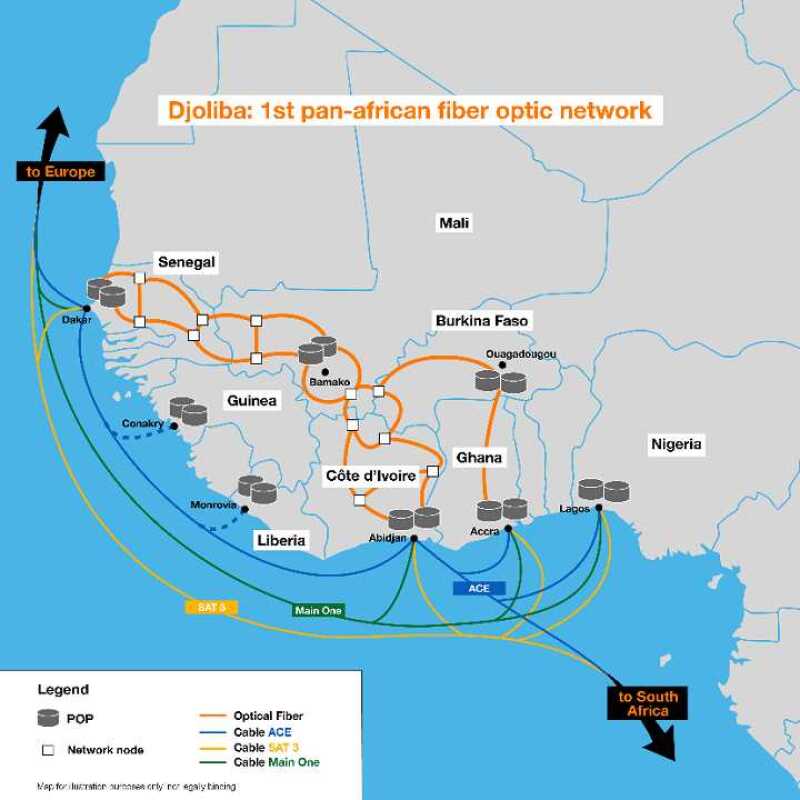This new network connects the capitals of Burkina Faso, Côte d’Ivoire, Ghana, Guinea, Liberia, Mali, Nigeria and Senegal. All of which are natively interconnected with their country’s domestic networks, which will centralise connectivity access for operators and companies.
During a press conference launch event, Alioune Ndiaye (pictured). chief executive officer of Orange Middle East and Africa, though unwilling to share the exact cost of this new infrastructure, shared that it cost ‘several hundred millions of Euros” to build based on the company’s annual investment of 1 billion Euros per year to develop its in African networks.
“Orange is actively contributing to the development of undersea and terrestrial infrastructure which enable the African continent’s digital transformation, by investing 1 billion euros each year,” said Ndiaye.
“With Djoliba, local populations will be able to access healthcare or educational services more easily, as well as the applications offered by cloud computing. Development of access to digital technology is a key challenge for Africa and I would like to congratulate our teams in all the countries for their remarkable work that has enabled the Djoliba project to come to fruition.”
This new infrastructure combines a terrestrial end-to-end fibre optic network with subsea cables for added security and resilience, as well as added redundancy, economies of scale and better internet access said, the press conference panel.
Operated and maintained from Dakar the backbone will benefit from greater efficiency, responsiveness and proximity, as well as a dedicated supervision centre.
Djoliba is also the first cross-border network, as historically operators had to integrate the solutions of various providers and join several different networks which were interconnected at the borders.

In all, Djoliba is comprised of 10,000km of terrestrial fibre, coupled with 10,000km of subsea cables, 16 points of presence with a grid of approximately 155 technical sites, which connects to a further 300 points of presence in Europe, America and Asia.
This in turn allows for the provision broadband with speeds of up to 100Gbps and delivers a 99.99% availability rate.
In addition, as it is based on Orange’s Tier 1 network it also provides seamless connectivity to the Group’s international networks.
“With Djoliba, Orange is once again confirming its expertise and leadership in the deployment and operation of international terrestrial and undersea networks. Consequently, all the operators, companies and institutions in West Africa now benefit from seamless connectivity that is open to the whole world, thanks to a single customer point of contact and unparalleled service availability,” added Jérôme Barré, CEO Orange Wholesale & International Networks.
“Djoliba is the fruit of a group effort, and thanks to a fully mobilised cross-functional team, we have been able to meet this sizeable challenge. This human adventure illustrates the Orange Group’s strength, both due to its local presence through its subsidiaries and its capacity to build shared international assets.”
Looking ahead, Barre during the press conference said that there are “two other countries we want to share capacity with” and they are “open to other countries” as well. This was further supported by Ndiaye who on the topic of expanding this network said “it will come. This is the first step and we remain open to other networks”.
Capacity is proud to partner with Orange International Carriers to bring you two webinars – one in English and one in French – to further reveal the strengths and benefits of the award-winning Djoliba network.
Register now to discover how the first pan-African backbone in Western Africa is a connectivity game-changer.
18 November (10:00 GMT) - Participez au webinaire Djoliba (En Français)
19 November (10:00 GMT) - Join the Djoliba webinar (In English)






